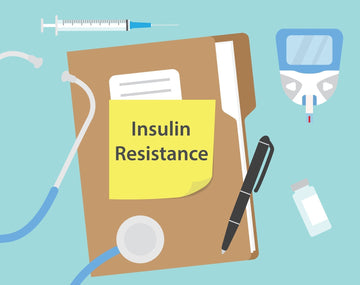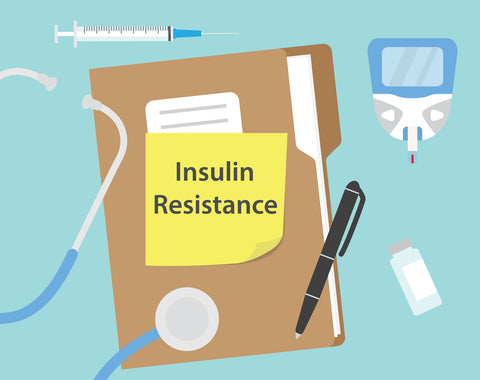

What You Should Know About Insulin Resistance
Do you know that insulin is a hormone?
So, why do our bodies make it?
Many of us may know that insulin has something to do with our blood sugar levels, but how many of us have stopped to think about how insulin works in the body?
Insulin plays a vital role in our overall health and wellness, keeping bodily systems functioning on all cylinders so we can enjoy everything life has to offer.
With the help of Dietitian and Nutritionist Katie Chapmon, here is what you should know about insulin resistance.
What Is Insulin?
Your pancreas produces insulin and secretes it into the bloodstream, regulating blood glucose (sugar) levels. But how does the pancreas know to make and release insulin?
When you eat a meal or a snack, your body breaks down most of that food into glucose that enters your bloodstream, causing your blood sugar levels to increase.
Elevated blood sugar levels signal your pancreas to get to work. How much insulin the pancreas produces depends on how high your blood sugar increases.
As insulin travels through your bloodstream, it helps glucose enter the body’s cells as an energy source that keeps them healthy and high-functioning.
How Does Insulin Work?
Each cell in your fat, muscles, and liver has an insulin receptor and a glucose channel (transporter).
The insulin from the pancreas connects with each cell’s insulin receptor, opening the glucose channel, a straight shot for glucose from your bloodstream into your cells.
In other words, insulin acts like a key, unlocking the door that lets glucose enter the cell as an energy source.
As the body uses up the glucose, blood sugar levels naturally decrease to an average level, and the pancreas stops its insulin production.
What Is Insulin Resistance?
Insulin Resistance is when the fat, muscle, and liver cells build up a tolerance to insulin, also known as low insulin sensitivity, and is the trademark precursor of prediabetes and type 2 diabetes.
The pancreas boosts insulin production to counteract insulin sensitivity impairment, working harder to signal fat and muscle cells to consume and liver cells to store glucose.
In its early stages, insulin resistance alone most likely will not display any symptoms due to the pancreas’s ability to produce extra insulin. However, that doesn’t last forever.
As insulin resistance worsens, the pancreatic cells responsible for insulin creation wear out due to constant insulin over-production, resulting in higher blood sugar levels.
The Adverse Effects of High Blood Sugar
The longer your blood sugar levels stay elevated, the higher your risk for developing prediabetes and type 2 diabetes.
Other health complications associated with high blood sugar levels include:
- Heart disease,
- Kidney disease, and
- Vision loss.
Regulating your blood sugar and insulin is also essential to successful weight management.
Weight Management
1. Increased Insulin Secretion:
Along with signaling your body’s cells to pull glucose from the bloodstream to use as energy, insulin also broadcasts instructions telling cells to store glucose not immediately used for energy in your muscles and liver and as fat tissue for future use.
If there is insulin in your system, your body will not tap into its glucose stores. On the contrary, the hormone will keep instructing your body to store glucose, and once your liver and muscles take all they can, the rest is converted into fat.
2. Chronically Elevated Blood Sugar:
When the pancreas consistently supplies high amounts of insulin, the longer it takes for the hormone to disappear, the less glucose your body will draw from its fat stores.
Once the pancreatic cells wear out, causing insulin levels to drop and blood sugar levels to rise, the more glucose your body sends into storage. But once the liver and muscles take on as much sugar as possible, the body distributes the rest into fat tissue.
Your body’s reduced need to tap into its fat, muscle, and liver stores compounds with its need to store more excess blood sugar, significantly hindering weight management goals.
Medications That May Help
When paired with a healthy diet and exercise, oral and injectable medications may help lower your A1C (blood sugar levels). Doctors commonly prescribe these medications to individuals with prediabetes and type 2 diabetes.
Oral Intervention
Metformin
Metformin is a drug that aims to reduce high blood sugar in individuals with type 2 diabetes in several ways, including but not limited to:
- Decreasing how much glucose your body absorbs.
- Enhancing your body’s insulin sensitivity.
Thiazolidinediones (Glitazones)
Thiazolidinediones (glitazones) are insulin sensitizers and help lower blood sugar. Thus, it promotes insulin resistance improvement.
Injectable Intervention
Most people with type 2 diabetes are prescribed insulin as a daily injection to help manage their blood sugar levels.
Sometimes, doctors may also prescribe other glycemic control medications for individuals with prediabetes and type 2 diabetes, either paired with insulin injection therapy or as a stand-alone treatment.
Insulin Injection Therapy
Insulin helps coax the bodies of individuals with insulin resistance to use glucose for energy. Those of us taking insulin must administer it into the fat under our skin using a syringe and needle for the manufactured hormone to enter the bloodstream.
A doctor may choose from various types of insulin injections and strengths to prescribe to their patient.
The type of insulin determines:
- How quickly the injection works.
- When the effects of the insulin peak.
- The duration of the insulin’s effects.
The most common insulin strength in the U.S. is U-100 or 100 units of insulin/milliliter of liquid.
Individuals with extreme insulin resistance may also receive a strength of U-500.
Glycemic Control & Weight Management Medications
Alternative glycemic control medications have been circulating the market since about 2010.
Many of these medications branch from the same fundamental scientific understanding of how insulin interacts with other hormones your body produces and how that affects insulin sensitivity, blood sugar levels, and weight.
You may recognize some common brand names, such as:
- Mounjaro®,
- Ozempic®, and
- Victoza®.
To learn more about these types of medications, please read through our four-part Weight Loss Injectables series:
Nutritional Intervention
Altering our dietary habits to include more whole foods that are naturally satiating, anti-inflammatory, and rich in fiber is a quick and effective way to start building a lifestyle that features glycemic control into our daily routines.
One way to make a change is to stay fiber-focused. This micronutrient slows digestion and reduces blood sugar spikes, reducing how high your blood glucose levels jump after eating and the stress those spikes put on the pancreas to produce more insulin.
Fiber-rich foods include:
- Beans and Legumes – E.g., Chickpeas, Lentils, Peas
- Whole Grains – E.g., Brown Rice, Quinoa, Whole-Grain Bread
- Vegetables – E.g., Carrots, Leafy Greens, Mushrooms
Nutrition Continued
Other delicious and nutritious choices support healthy bodily processes thanks to qualities such as:
- Hunger-Reducing,
- High in Antioxidants, and
- Low in Saturated Fat.
Foods with these benefits include:
- Fruit – E.g., Apples, Berries, Citrus Fruits
- Lean Protein – E.g., Egg Whites, Skinless Poultry, White Fish
More Tips For Fighting Insulin Resistance
Example: Eat your meals and snacks between 8:00 a.m. and 6:00 p.m. (10 hours) and fast from 6:00 p.m. to 8:00 a.m. (14 hours).
Fasting and non-fasting periods will vary from person to person. Please consult your doctor or dietitian on which timeframes are best for you.
Your muscles need more energy to perform against varying resistance intensities and will tap into your fat stores when your current blood sugar levels cannot fulfill those energy demands.
Get the Resources & Support for Your Health Needs
ProCare Health is a premium supplier of bariatric multivitamins and supplements and a support system created for and by the bariatric community.
Whether you are considering bariatric surgery, preparing for a procedure, or navigating life post-operation, we are here to help lead you toward successful and sustainable weight loss by forming life-long healthy lifestyle habits.
To learn more about our bariatric community and how it can benefit you, please visit https://procarenow.com/pages/bari-connected.
Professional Contributors
The professional insight of the award-winning Dietitian and Nutritionist Katie Chapmon supplements the following information.
With over ten years of hands-on clinical experience in bariatric surgery and weight management, Chapmon’s wealth of educational and reliable information provides accurate medical-specific data and facts.










